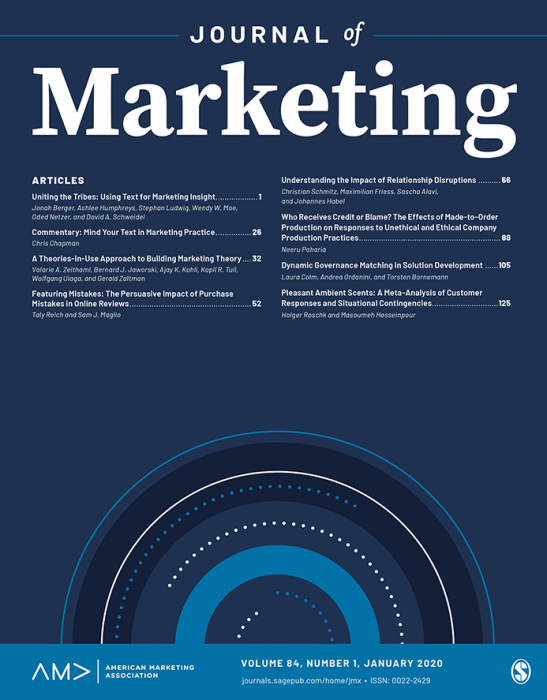EXPRESS: Self-Donations and Charitable Contributions in Online Crowdfunding: an Empirical Analysis
IF 10.4
1区 管理学
Q1 BUSINESS
引用次数: 0
Abstract
Many charitable projects have started using online crowdfunding platforms to raise donations. The rise of these platforms as fundraising vehicles has been partially driven by easy access to a large pool of potential donors without the significant marketing costs that commonly accompany traditional fundraising. However, such a low cost of entry also results in a significant "crowding" of projects, making it difficult for donors to decide which projects to donate to. Thus, a charitable project encounters a fundamental marketing challenge of standing out from other projects when conventional techniques like advertising and promotion are limited. In this paper, we posit that a project can credibly signal its quality via a strategy of "self-donation," whereby the project steward donates to her own project.Our empirical setting is an online education crowdfunding platform. By examining millions of donations, we find that self-donations improve the donation pace, contributed amount, and funding success. We show that the self-donation strategy works only when a self-donation is visible to potential donors and is especially effective at the early stage of the funding cycle or when project stewards are inexperienced, where the projects face significant uncertainty. We find evidence for self-donation as a quality signal through various observable proxies like impact letters to donors and corporate matching. Overall, our findings are consistent with a signaling mechanism that allows the separation of high-quality projects from lower-quality ones.快讯在线众筹中的自捐和慈善捐款:实证分析
许多慈善项目已开始使用在线众筹平台筹集捐款。这些平台作为筹款工具的兴起,部分原因是可以方便地接触到大量潜在捐赠者,而无需像传统筹款那样支付高昂的营销费用。然而,如此低的进入成本也造成了项目的严重 "拥挤",使捐助者难以决定向哪些项目捐款。因此,在广告和促销等传统手段有限的情况下,慈善项目面临着从其他项目中脱颖而出的基本营销挑战。在本文中,我们假设一个项目可以通过 "自我捐赠 "的策略,即项目监管人向自己的项目捐赠,来可信地表明其质量。我们的实证环境是一个在线教育众筹平台。通过对数百万次捐款的研究,我们发现自捐提高了捐款速度、捐款金额和筹资成功率。我们的研究表明,只有当潜在捐赠者能看到自我捐赠时,自我捐赠策略才会起作用,尤其是在筹资周期的早期阶段或项目管理人员缺乏经验、项目面临重大不确定性的情况下,自我捐赠策略尤为有效。我们通过各种可观察到的代用指标,如致捐赠者的影响信和企业匹配,找到了自我捐赠作为一种质量信号的证据。总体而言,我们的研究结果与信号机制是一致的,该机制可以将高质量项目与低质量项目区分开来。
本文章由计算机程序翻译,如有差异,请以英文原文为准。
求助全文
约1分钟内获得全文
求助全文
来源期刊

Journal of Marketing
BUSINESS-
CiteScore
24.10
自引率
5.40%
发文量
49
期刊介绍:
Founded in 1936,the Journal of Marketing (JM) serves as a premier outlet for substantive research in marketing. JM is dedicated to developing and disseminating knowledge about real-world marketing questions, catering to scholars, educators, managers, policy makers, consumers, and other global societal stakeholders. Over the years,JM has played a crucial role in shaping the content and boundaries of the marketing discipline.
 求助内容:
求助内容: 应助结果提醒方式:
应助结果提醒方式:


